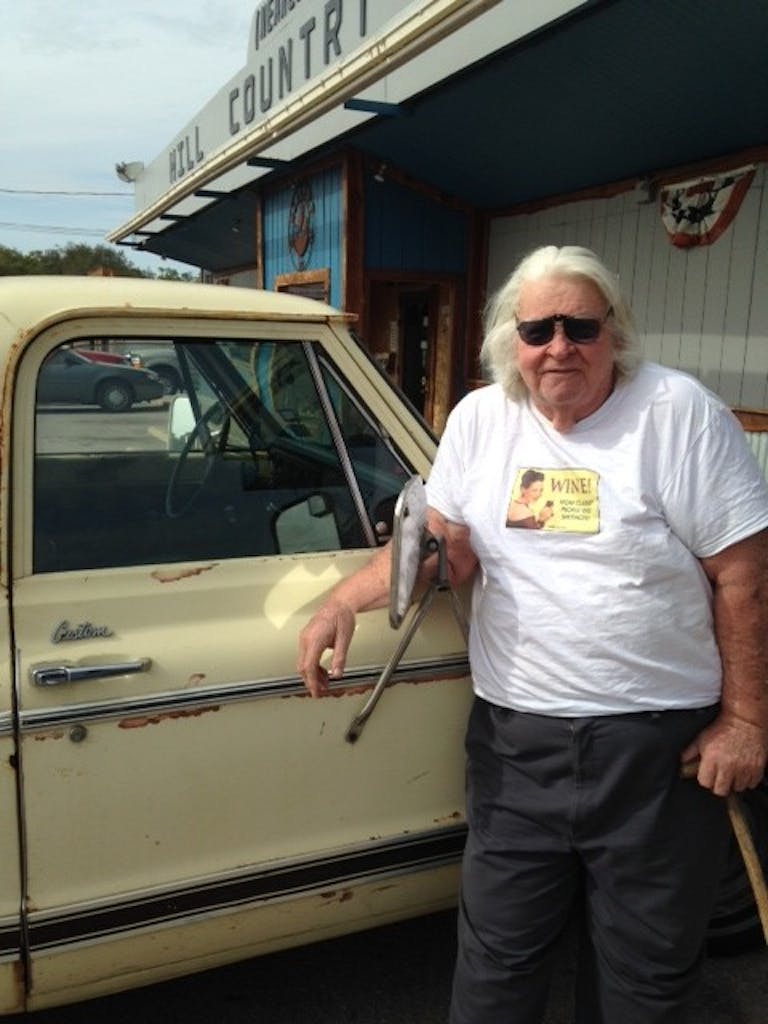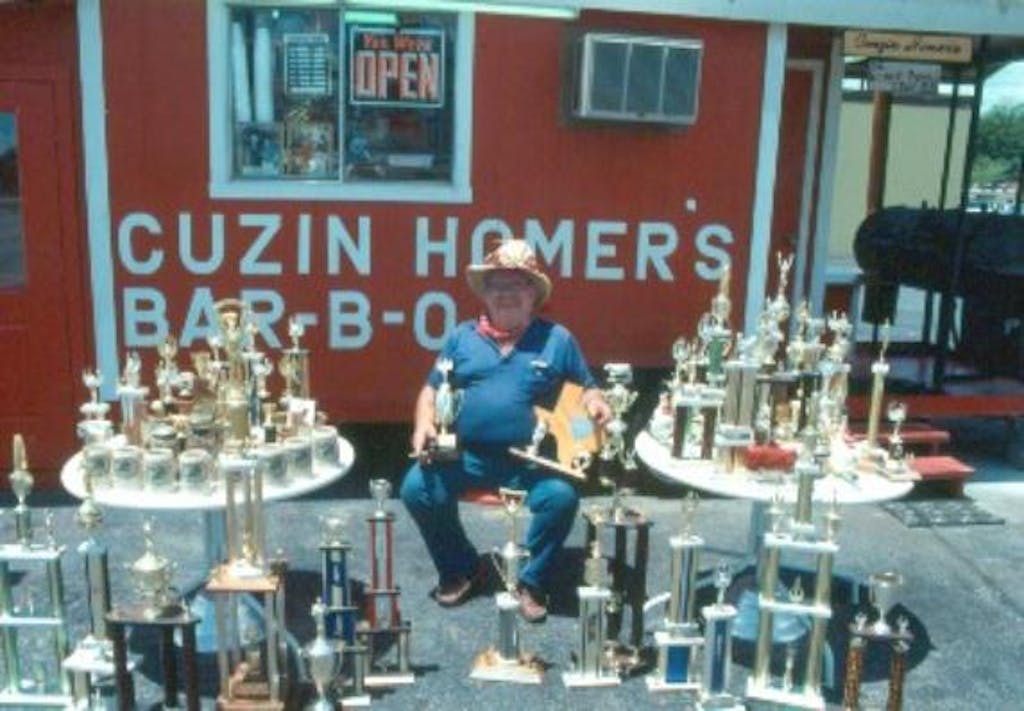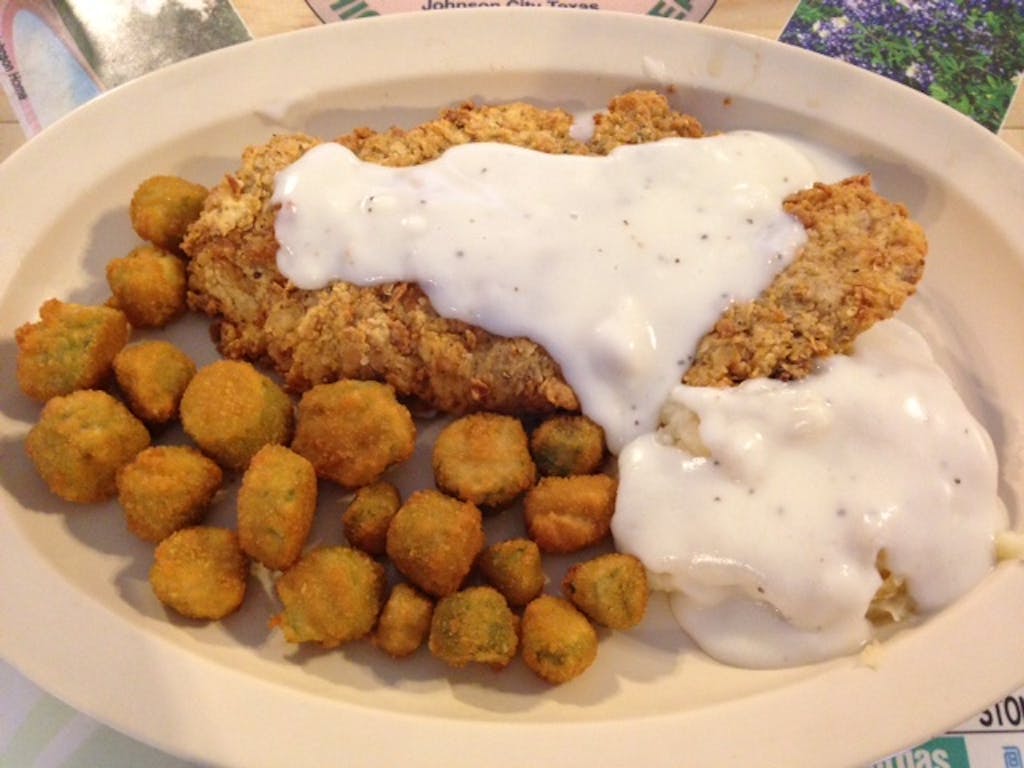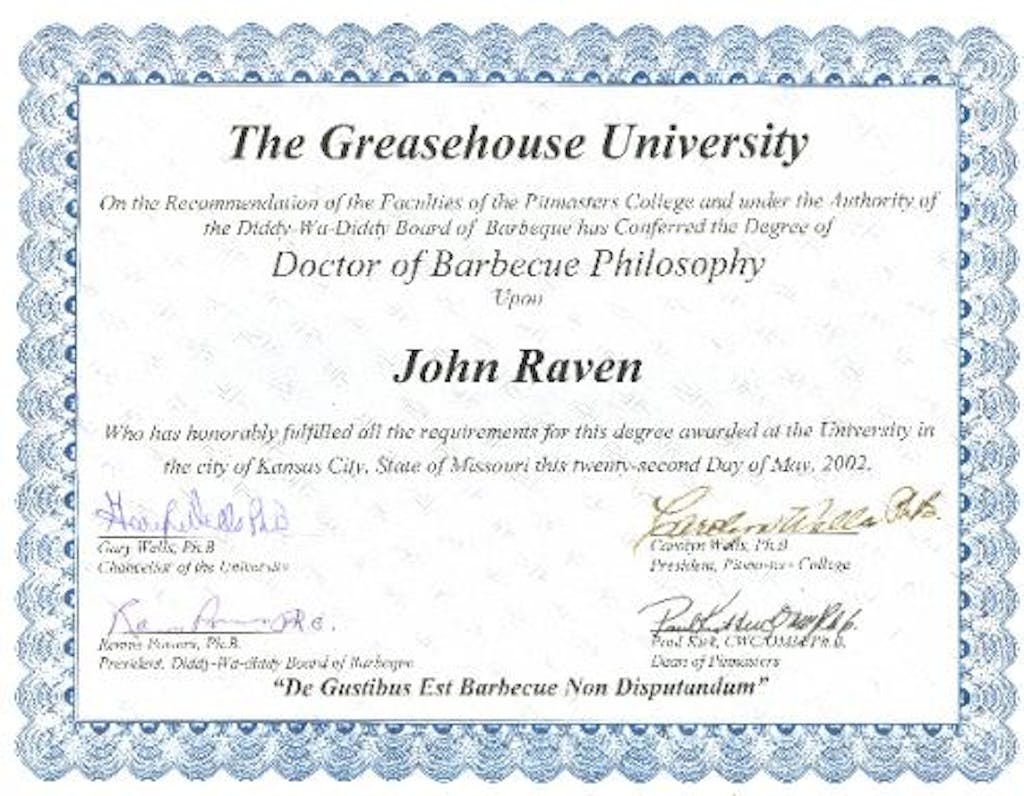 Title: Commissioner of Barbecue, PhB
Title: Commissioner of Barbecue, PhB
Age: 76
“Allow me to introduce myself. I am John Raven. I am the individual who has done more for barbecue than anyone else.” Those were the first three sentences in a letter I received about a year ago. It was the first letter I received after being named the barbecue editor at Texas Monthly. I then went searching for more about Mr. Raven when I found his barbecue autobiography. “I know more about barbecue than anyone.” I knew I needed to talk with him, but it took a year to make it happen.
We had planned to meet in Johnson City – where Raven currently resides – at Ronnie’s BBQ. They were sold out for he day, so we moved our conversation to the Hill Country Cupboard just up the street. John Raven has a good-natured penchant for exaggeration, so when he promised that Hill Country Cupboard would be the “Snow’s of chicken fried steak” if anyone would bother to discover it, I was dubious. It was a good chicken fried steak, but the conversation was better. When I asked John why he had been set on talking with me he said “I put so much time into the barbecue stuff that I’d like to get a little recognition for it. I missed out on all the money end of it.”
Raven is quite a character. He once took on the persona of daredevil Bad McFad, he’s a descendent of prominent Texan Ernst Raven, and claims to have changed the way event promotion is done today. Raven has lived through the rise and fall of chili cook offs in Texas, and enjoys the continuing rise of barbecue here in the state. Way back in 1981 he formed the Texas Barbecue Appreciation Society and in the same year he started the “Barbecue Times” which was an early [Raven claims “the first”] barbecue newsletter. Raven is also a barbecue historian. He contends that “The World Championship Cow Country BBQ Cookout held June 3, 1972 in Uvalde, Texas was the first Barbecue Cooking Competition in the United States.” I haven’t found anyone who can refute it, and neither has John Raven.
Throughout the interview I have linked back to John Raven’s barbecue website where you can find more in-depth articles written by him on much of the subject matter covered.
John Raven: I have a philosophy that sums up everything in two sentences. If people could understand it everything would work better.
Daniel Vaughn: And those two sentences?
JR: Number one: Life ain’t fair. Number two: S— happens. If you understand that, what else is there to know? I sit down and think about stuff like that a whole lot. I’m self educated – autodidactic. I’m educating myself constantly.
DV: What are you currently educating yourself on?
JR: The world economy. People don’t understand it.
DV: Was it through self education that you ended up getting a PhB?
JR: It is bestowed by the Greasehouse University of the Kansas City Barbeque Society.
DV: What does PhB stand for?
JR: Doctor of Barbecue Philosophy.
DV: When did you receive it?
JR: I’d have to look. I know it’s been a long time. [Raven’s certificate is dated May 22, 2002].
DV: Was there a ceremony?
JR: No. They mailed it to me. It wasn’t a big deal. I lost my original, but I got them to make me another.
DV: You have a long history in barbecue and chili competitions. Is there one of those that you put more effort into?
JR: The barbecue cook offs, that’s my specialty right there. I’m not the one that gets out there and cooks it. I’m the behind the scenes guy that runs it.
DV: So, you’re not a barbecue competitor, but you’ve worked on the promotion side?
JR: I’m the promoter. I invented promotion as it’s known today.
DV: Really?
JR: Listen, if you’ve done it or you can do it, it’s not bragging. I’ve got all of this documented.
DV: So where did it all start?
JR: In 1977 I got invited to judge at the Taylor International Barbecue Cook-Off. Bob Roberts was a good friend of mine and he’s the one that founded it. I got over there, and it was a great time. They treated the judges like royalty. There were some very interesting people there. We had everything from Hollywood actors to people who were flying in with Jimmy Doolittle on his flight.
DV: Were they judges or just there to watch?
JR: They were judges. It was worth the price of admission just to hang around with them. Rip Torn was an old Taylor boy. They had several of the Dallas Cowboys down there when they were prime.
DV: How many years had this barbecue competition existed before you were involved?
JR: That was the first year. The judging was so screwed up. Whoever was running it thought every judge should taste every entry. You’ve got a hundred entries in seven different categories, so I’m gonna sit there and taste seven hundred different things? I did eighty-three briskets and twenty-four chickens that day, and I told them “that’s it. If you don’t get this straight, I’m not coming back.” Bob and I got together. They worked on that thing, and for an amateur contest it did really well.
DV: How was the barbecue?
JR: It was the most fantastic barbecue ever. The brisket would bring tears to your eyes.
DV: Did you keep judging every year?
JR: I judged twenty-three of the first twenty-five years. Then I judged on and off a few more times.
DV: Why did you stop?
JR: Health reasons mainly. It just got to be too much to handle.
DV: Is it still as big as it once was?
JR: For a while they ran at their one hundred team limit. Now they do just thirty-five or forty. It has become a show for the locals, which is fine. When it started downhill I told them just to shut it down and give it a decent burial, but they’re doing fine with it now. I told them to never get one of those sanctioning groups. That’s one of my hot spots right now. Those sanctioning groups have done nothing but leech money off of barbecue people – the ones that do the work.
DV: I often laugh at the prize money they’re giving out at some of these competitions. Even if a team wins the grand prize they might just get enough to cover their expenses.
JR: You might pay your gas money. All of our hobbies have turned into that. It’s all about how much money you can spend.
DV: Have you ever competed in the barbecue competitions?
JR: Well, I had to show them I could do it. Down in Navasota I won. We had some of the hot traveling teams down there. I also won the margarita contest down there.
DV: What was the big barbecue competition that you organized?
JR: I had the Tournament of Champions. I put on four of those. It was the first barbecue competition that you had to qualify for. You couldn’t just drive up and enter.
DV: Where was it held?
JR: That was in Trader’s Village in Grand Prairie. At that time they were the biggest flea market in the world. On any given weekend they had a guaranteed crowd of 22,000. We had the biggest rain the first year. The cook off went on, and we had a world champion crowned. It was Sam LeGear. Somewhere he’s got a silver belt buckle that says he was the world champion barbecue cook. He could go into nearly any kind of cook off and win. He went down to the Chilympiad down in San Marcos and won it three years in row. Nobody’s ever done that.
Enjoy this overly dramatic look at the 1979 Chilympiad.
DV: What was your group called that organized the barbecue world championship?
JR: It was the International Barbecue Society Tournament of Champions. There were four of them. Two were in Trader’s Village, one in Uvalde, and one in Temple.
DV: How did you choose where they were held?
JR: My idea was to put the thing on the auction block, and whatever town wanted a big deal, we’d go to that town. That’s how we got to Uvalde in 1986. Uvalde also featured the most rain ever seen there which happened during on of our cook offs. We had a couple from Virginia out there. They woke up in the morning on their air mattresses about to float out of their tent. They spent the rest of the night in the truck.
DV: How many cooks would show up to these early contests?
JR: About thirty-five or forty.
DV: How long did the Tournament of Champions run?
JR: I did four. 1984, ’85, ‘86, and we skipped ’87 and did it again in 1988. [For reference, the KCBS was founded in 1985].
DV: Do you have idea why there are so many sanctioning bodies for barbecue competitions in Texas, while the KCBS has pretty much covered the rest of the country?
JR: Texas barbecuers are damn hard to organize. They don’t want anyone to tell them what to do, so they start their own sanctioning body if there’s a disagreement.
DV: Which did you enjoy more, the barbecue competitions or the chili?
JR: The worst barbecue I ever got a hold of is nowhere near as bad as the worst chili I ever got ahold of. I had some chili that would send you to bed. The barbecue cook-offs is where the product is developed. You don’t have anyone sitting in a trailer in Austin trying a different recipe every week to see which one they like best. They got one they like, and they’re going to stay with it.
DV: Other than barbecue joints opened by competitors, where do you see the influence of competition cooking in the commercial barbecue world?
JR: It’s influencing it. The people at the cook offs will go to their regular place and tell them about the brisket they had last weekend. It might have had a little cayenne pepper, or a little something else. The guy who is selling the stuff is listening to them.
DV: What kind of meat were they cooking in the early competitions?
JR: When they started out here, the only thing they cooked was brisket. Then they wanted to cook chicken since everyone knew how to cook chicken. They’d throw a half chicken on the smoker, but when they turned it in it could be dead, still running around pecking, or anything in between. Then someone decided that we need to work on the chicken a bit. My buddy up in Temple named Homer Page was a terrific barbecue cook. He developed the “Cuzin Homer Page Chicken Delights.” They were boneless skinless thighs with a piece of jalapeno, all rolled up in a piece of bacon, then it was grilled to perfection. That chicken won more contests than you can imagine. Then they moved up to the beer can chicken. Now the chicken is good. I don’t mind judging it now.

DV: Did Homer Page run a barbecue joint?
JR: He was one of the trailer pioneers. He had one of the first barbecue trailers around. He had one in Temple. He did exceptional with it. He cooked his briskets without any seasoning. They were only exposed to heat and smoke from the oak wood. I saw him take frozen briskets out of the packet, stack them up in there and cold smoke them for three hours in the afternoon. He’d adjust his fire before he went home. He’d come back the next morning and have the best barbecue around.
DV: He really started with frozen briskets?
JR: Yes. He had a good reputation of being the best around. Everybody else was trying to cook with mesquite back then, and Homer had access to some good oak.
DV: Have you seen a shift in Texas from mesquite to oak?
JR: I don’t see them advertising mesquite as much anymore.
DV: Is Homer still around?
JR: Homer passed away. His son Todd opened a joint down in Bulverde several years ago, and was doing real good with it, but it’s closed now.
DV: When did you start writing about barbecue?
JR: I was getting space in the Goat Gap Gazette, which was the chili cook off newsletter. I started doing barbecue news. I’m the first one who ever put out barbecue news.
DV: Is that basically what the KCBS Bullsheet is now?
JR: I don’t agree with a lot of the stuff that Kansas City does, but they do it better than anybody else does it. When I saw that I couldn’t carry on with IBS anymore I gave my mailing list to Kansas City and they went from there. My real issue is that they’ve got these trained judges. That’s just as useless as can be.
DV: You mean certified barbecue judges? I’ve got my card.
JR: Useless. I pick five judges off the street and you pick five of your certified judges and they’ll pick the same winner.
DV: How many competitions do you think you’ve judged?
JR: At one time I bragged at having tasted more barbecue than anyone else in the world. That’s back when I was going to a cook off every weekend. That was in the middle eighties. 1988 is when I dropped out.
DV: You’re a writer and promoter. What other jobs have you held in the past?
JR: I spent thirty years in the construction trade. That cratered. I worked for three years for the City of Temple Police Department in the maintenance garage. I kept fifty cars on the street. Everything went to hell, so I moved down here and lived in a barn in Luckenbach. I did some odd jobs, mowed yards, whatever I could do to make a buck. I found out I was a good wood carver, so I spent a while there making wooden spoons and little dangles and stuff. In 1994 they wanted me to do the Luckenbach Moon. I did thirteen issues of the Luckenbach Moon. I made money on every issue. That thing has been out for thirty years, but I’m the only one who can tell you they made any money off of it.
DV: Why’d you quit doing it?
JR: I couldn’t get along with management, but Luckenbach is my spiritual home.
DV: Where did you grow up?
JR: I spent my first nineteen years in Taylor, then I moved to Temple until 1988 when I moved out here. I lived in my station wagon at the top of the hill, then I found an old abandoned beer joint in Fredericksburg, and I moved into there. I was there a couple years. It was pretty nice. I got into the public housing over here now, and I’ll stay there as long as I can. It’s nice.
DV: Well, you’ve survived this long.
JR: I’ve been homeless three times and out on the street twice, and wasn’t none of it my fault. It’s just that I won’t work in the system.
DV: Back when you were growing up in Taylor, did you ever eat at the big names like Louie Mueller, Taylor Café, or Rudy Mikeska’s?
JR: My first barbecue in Taylor came from a place down on South Main. It was called Novosad’s. The parents of my uncle’s wife ran the place. They were the Veselkas. It was the first place I ever had barbecue. If we were feeling affluent and had an extra dollar, daddy would go down there on Sunday and bring a pot along. He’d come back home with enough barbecue for supper. It was delicious. I don’t remember much else until we were running around at high school age. We were in love with the hot sausage. We called them hot guts back then. At Taylor Café you could go down and get some hot guts and handful of crackers for a quarter. That was hard to beat, so we were there pretty often. Taylor Café back then was known as a half-and-half. The bar ran down the middle. Some sat on one side, and the others sat on the other side, so it was a half-and half. The railroad men hung out down there.
DV: Is that what they called a segregated restaurant back then, a half-and-half?
JR: Well, that’s what Taylor Café was called. A little while later we would go up to Louie Mueller. Then Rudy Mikeska had a little place up on Fourth Street. He made several moves before they ended up moving into that big building. I never did go to Mikeska’s much. I just didn’t care for his product. They were in the catering business. In fact, the best commercial brisket I ever got came from Mopsy Mikeska who catered one of our high school reunions. The brisket was absolutely fantastic. I never did get to ask her any details about it. Usually your catered stuff is right down the middle. It’s not going to offend anyone, and it’s not really going to enchant anyone. That was mighty good stuff.
DV: Do you have any favorite barbecue joints?
JR: Louie Mueller. That’s home. I don’t really get out that much anymore, but for a while Cooper’s up in Llano was pretty good. I see they’re looking to open up another in downtown Austin. They ain’t gonna make it.
DV: What is your favorite order?
JR: All I eat anymore is brisket and potato salad. That’s really what I’m about.
DV: When you say you invented promotion, do you mean for barbecue or event promotion in general?

JR: Anything. I can make this place [Hill Country Cupboard where we each had a chicken fried steak] famous.
DV: What are you waiting for?
JR: I got them a spread on the internet that looked real nice, and all I got was some chicken fried steak.
DV: That’s not a bad trade. This is good chicken fried steak.
JR: Yeah. But I know what the other ones are getting.








